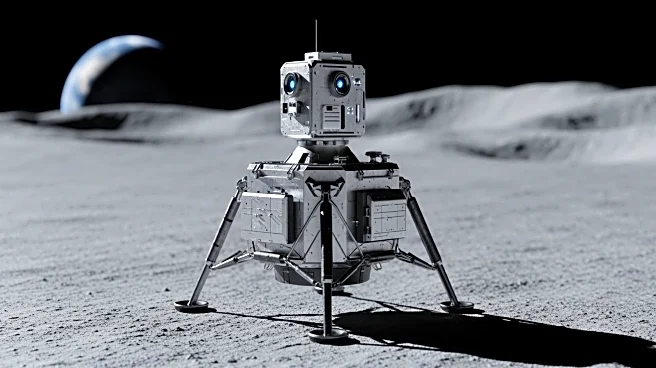What's Happening?
Impulse Space, a commercial space company founded by Tom Mueller, has announced its plans to develop a robotic moon lander aimed at advancing lunar exploration. The company, which specializes in in-space transportation, intends to launch its first lunar landing
mission by 2028. Impulse Space's strategy involves using its Helios kick stage to transport the lander from low Earth orbit to low lunar orbit, where the lander will then descend to the moon's surface. This mission architecture leverages Helios' high delta-v capabilities, eliminating the need for in-space refueling. The company aims to deliver up to 3 tons of payload to the moon, potentially including lunar terrain vehicles, rovers, communication systems, power generators, and habitation modules. Impulse Space has already begun developing the moon lander's engine, utilizing a nitrous and ethane bipropellant, similar to the one used in its Mira space tug.
Why It's Important?
The development of a robotic moon lander by Impulse Space represents a significant step in the commercialization of lunar exploration. By providing a cost-effective solution for delivering midsize payloads to the moon, Impulse Space could facilitate the establishment of a sustainable lunar presence. This initiative aligns with broader efforts to expand human activities beyond Earth, potentially supporting scientific research, resource extraction, and the development of lunar infrastructure. The ability to transport multi-ton cargo to the moon could accelerate the deployment of essential equipment and systems necessary for long-term lunar habitation and exploration. Impulse Space's entry into the lunar lander market also highlights the growing role of private companies in space exploration, complementing government-led initiatives such as NASA's Artemis program.
What's Next?
Impulse Space plans to continue developing its lunar lander and Helios kick stage, with the first mission anticipated as early as 2028. The company will focus on refining the lander's engine and mission architecture to ensure successful payload delivery to the moon. As Impulse Space progresses, it may collaborate with other space agencies and private companies to integrate its lander into broader lunar exploration strategies. The success of Impulse Space's lunar missions could pave the way for future partnerships and commercial opportunities in space transportation and lunar infrastructure development.
Beyond the Headlines
Impulse Space's initiative to develop a robotic moon lander could have broader implications for the space industry, including fostering innovation in propulsion technologies and mission design. The company's approach to rapid development and deployment may influence other space ventures, encouraging efficiency and cost-effectiveness in space exploration projects. Additionally, the successful implementation of Impulse Space's lunar lander could contribute to international efforts to establish a permanent human presence on the moon, potentially serving as a stepping stone for future missions to Mars and beyond.















